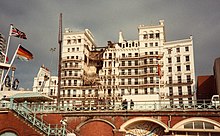
Margaret Hilda Thatcher, Baroness Thatcher, was a British stateswoman and Conservative politician who served as Prime Minister of the United Kingdom from 1979 to 1990 and Leader of the Conservative Party from 1975 to 1990. She was the longest-serving British prime minister of the 20th century and the first woman to hold the position. As prime minister, she implemented economic policies known as Thatcherism. A Soviet journalist dubbed her the "Iron Lady", a nickname that became associated with her uncompromising politics and leadership style.

Norman Beresford Tebbit, Baron Tebbit, is a British politician. A member of the Conservative Party, he served in the Cabinet from 1981 to 1987 as Secretary of State for Employment (1981–1983), Secretary of State for Trade and Industry (1983–1985), and Chancellor of the Duchy of Lancaster and Chairman of the Conservative Party (1985–1987). He was a Member of Parliament (MP) from 1970 to 1992, representing the constituencies of Epping (1970–1974) and Chingford (1974–1992).

Lieutenant Colonel Airey Middleton Sheffield Neave, was a British soldier, lawyer and Member of Parliament (MP) from 1953 until his assassination in 1979.

Sir Anthony George Berry was a British Conservative politician. He served as Member of Parliament (MP) for Enfield Southgate and a whip in Margaret Thatcher's government.

The 1987 United Kingdom general election was held on Thursday 11 June 1987, to elect 650 members to the House of Commons. The election was the third consecutive general election victory for the Conservative Party, who won a majority of 102 seats and second landslide under the leadership of Margaret Thatcher, who became the first Prime Minister since the Earl of Liverpool in 1820 to lead a party into three successive electoral victories.
The Deal barracks bombing was an attack by the Provisional Irish Republican Army (IRA) on the Royal Marine Depot, Deal, England. It took place at 8:22 am on 22 September 1989, when the IRA exploded a time bomb at the Royal Marines School of Music building. The building collapsed, killing 11 marines from the Royal Marines Band Service and wounding another 21.
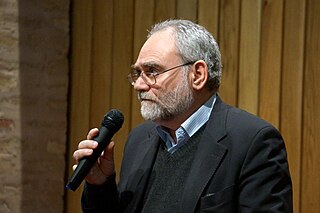
Patrick Joseph Magee is a former Provisional Irish Republican Army (IRA) volunteer, best known for planting a bomb in the Brighton Grand Hotel targeting Prime Minister Margaret Thatcher and her Cabinet, which killed five people. He is often referred to as the Brighton bomber.

From 1969 until 1997, the Provisional Irish Republican Army (IRA) conducted an armed paramilitary campaign primarily in Northern Ireland and England, aimed at ending British rule in Northern Ireland in order to create a united Ireland.

The Grand Brighton Hotel is a historic Victorian sea-front hotel in Brighton on the south coast of England. Designed by John Whichcord Jr and built in 1864, it was intended for members of the upper classes visiting the town and remains one of Brighton's most expensive hotels.
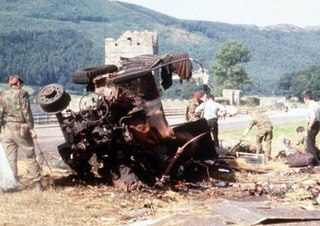
The Warrenpoint ambush, also known as the Narrow Water ambush, the Warrenpoint massacre or the Narrow Water massacre, was a guerrilla attack by the Provisional Irish Republican Army (IRA) on 27 August 1979. The IRA's South Armagh Brigade ambushed a British Army convoy with two large roadside bombs at Narrow Water Castle outside Warrenpoint, Northern Ireland. The first bomb was aimed at the convoy itself, and the second targeted the incoming reinforcements and the incident command point (ICP) set up to deal with the incident. IRA volunteers hidden in nearby woodland also allegedly fired on the troops, who returned fire. The castle is on the banks of the Newry River, which marks the border between Northern Ireland and the Republic of Ireland.
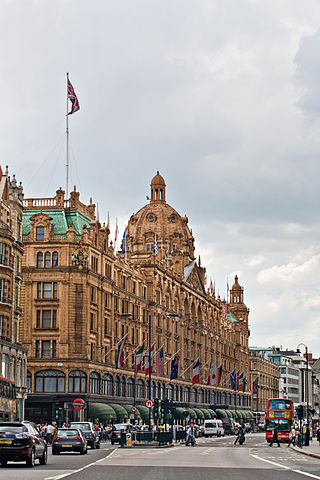
The Harrods bombing refers to the car bomb that exploded outside Harrods department store in central London, England, on Saturday 17 December 1983. Members of the Provisional Irish Republican Army planted the time bomb and sent a warning 37 minutes before it exploded, but the area was not evacuated. The blast killed three police officers and three civilians, injured 90 people, and caused much damage. The IRA Army Council said it had not authorised the attack and expressed regret for the civilian casualties. After the bombing, the IRA shifted its emphasis towards attacks on military targets in England.
Patrick Ryan is a defrocked Irish Catholic priest and admitted Provisional IRA arms supplier. He was laicised by the Pallottine Order in 1973.

Margaret Elizabeth Tebbit, Lady Tebbit was an English nurse who was paralysed from the chest down by the Provisional IRA's 12 October 1984 bombing of the Grand Brighton Hotel, where she was staying with her husband, Norman Tebbit, during the Conservative Party Conference.
The 1994 Heathrow mortar attacks were a series of homemade mortar bomb attacks targeted at Heathrow Airport carried out by the Provisional IRA. Over a five-day period, Heathrow was targeted three times by the IRA, which fired 12 mortar rounds. Heathrow was a symbolic target due to its importance to the United Kingdom's economy, and much disruption was caused when areas of the airport were closed over the period due to the IRA attacks. The gravity of the incident was heightened by the fact that Queen Elizabeth II was being flown back to Heathrow by the RAF on 10 March.

On 2 December 1984, a four-man Provisional Irish Republican Army (IRA) active service unit was ambushed by a British Army Special Air Service team while attempting to bomb a Royal Ulster Constabulary patrol who they had lured to Drumrush Lodge Restaurant. Two IRA volunteers and one SAS soldier were killed during the action.
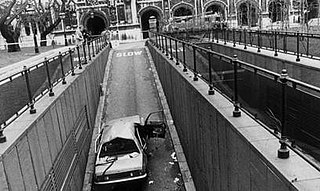
On 30 March 1979, Airey Neave, British Shadow Secretary of State for Northern Ireland, was assassinated by the Irish National Liberation Army with a bomb fixed under his car. The bomb detonated in the car park of the Palace of Westminster in London and mortally wounded Neave, who died shortly after being admitted to hospital.
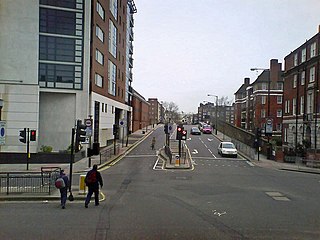
The Chelsea Barracks bombing was an attack carried out by a London-based Active Service Unit (ASU) of the Provisional IRA on 10 October 1981, using a remote-controlled nail bomb. The bomb targeted a bus carrying British Army soldiers just outside Chelsea Barracks. The blast killed two civilians and injured 40 people, among them 23 soldiers.
This is a timeline of the events and actions during the Troubles that were carried out in Great Britain, the vast majority of which were carried out by Irish Republican paramilitaries mainly the Provisional IRA were by far the most active but both the Official IRA and the Irish National Liberation Army, also carried out a number of attacks, which included bombings and shootings. Ulster Loyalist paramilitary groups also carried out a small number of violent actions.
On 25 June 1990, the Provisional IRA detonated a bomb at the Carlton Club, a club in London popular among MPs and supporters of the ruling Conservative Party. The bombing injured 20 people, one of whom, Lord Kaberry of Adel, died a year later. The ground floor collapsed to the basement and windows were shattered. The blast was felt up to half a mile away.
